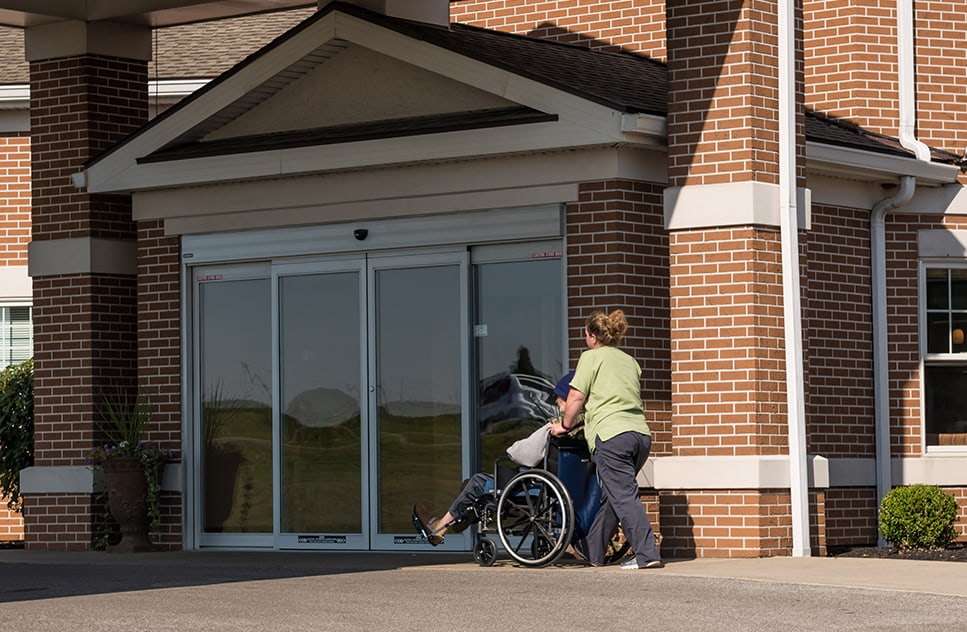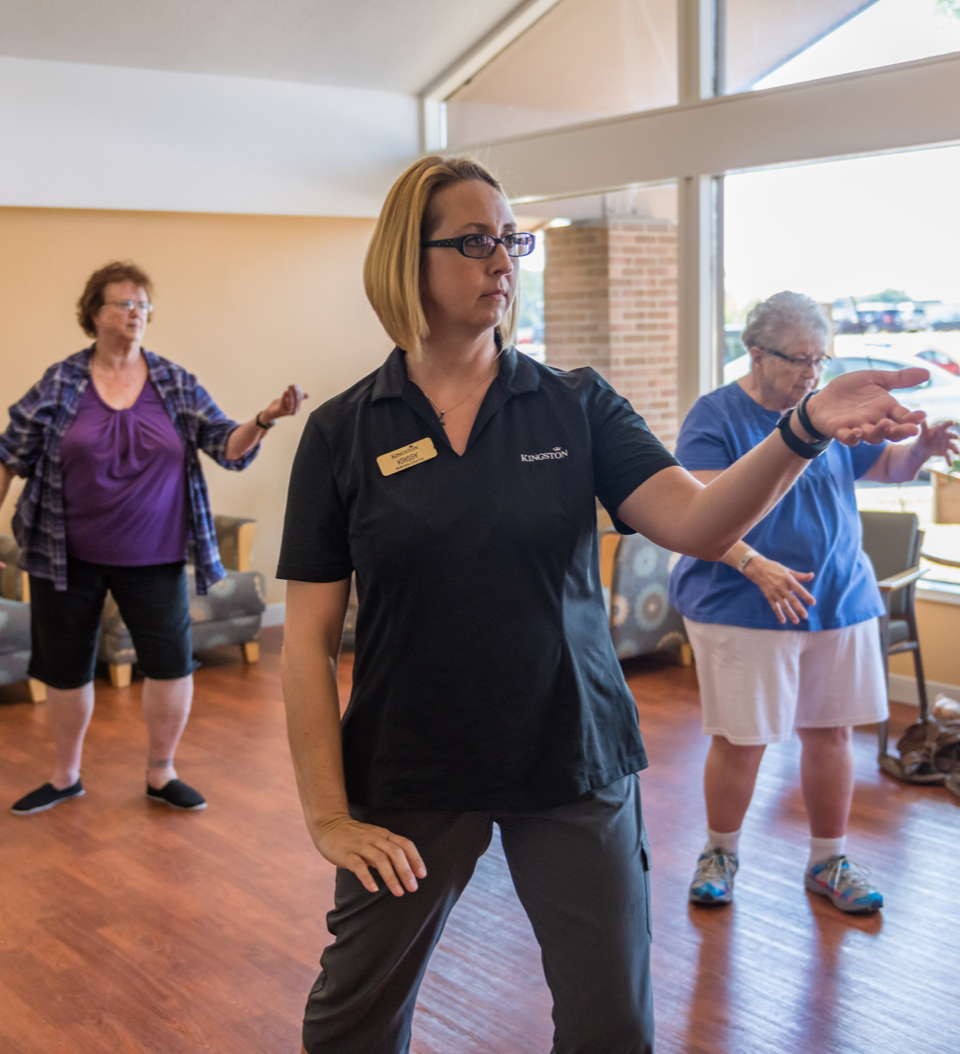Short-term care can be a lifeline for seniors and their families during times of transition, recovery, or respite. Short-term care bridges the gap between hospital and home, whether for post-surgery rehabilitation, temporary skilled nursing, or a needed break for family caregivers.
At Kingston of Ashland, our approach to short-term care services focuses on recovery, comfort, and peace of mind for both residents and their loved ones. Let’s explore what short-term care entails, who it’s for, and why Kingston of Ashland is a great choice for you or your loved one.
What is Short-Term Care?
Short-term care is designed for individuals who need temporary support while recovering from illness, surgery, or other health-related events. Depending on the individual’s needs, stays typically range from a few days to a few months.
Short-term care aims to provide a safe and supportive environment for recovery while offering specialized services like skilled nursing, therapy, or respite for caregivers. At Kingston of Ashland, we take a personalized approach, crafting individualized care plans to meet every resident’s unique needs.
Who Needs Short-Term Care?
Short-term care is ideal for a variety of situations, including:
- Post-Surgery Recovery: Individuals recovering from surgeries like joint replacements or cardiac procedures benefit from medical oversight and therapy services.
- Rehabilitation Needs: Seniors requiring physical, occupational, or speech therapy to regain strength and independence.
- Respite for Caregivers: Family caregivers often need a temporary break to recharge and focus on their own well-being. Short-term care at Kingston of Ashland provides this much-needed relief, ensuring families can rest easy knowing their loved ones are in capable hands.
At Kingston of Ashland, our compassionate staff and top-tier facilities are equipped to handle these and other short-term care needs, ensuring comfort and excellent care for every resident.
Types of Short-Term Care
Skilled Nursing Care
Skilled nursing care is designed to address medical needs with precision and expertise. This includes services such as wound care, IV treatments, and medication management, all provided by licensed professionals who are available 24/7. Whether it’s for short-term recovery or ongoing health management, skilled nursing ensures comprehensive, attentive care for your loved one.
Rehabilitation Care
Rehabilitation care focuses on helping individuals regain strength, mobility, and independence. Tailored to each person’s unique recovery goals, this care includes physical, occupational, and speech therapy. By addressing specific challenges, rehabilitation care empowers individuals to improve their quality of life and maintain their daily routines with confidence.
Respite Care
Respite care offers temporary relief for family caregivers, providing peace of mind while ensuring loved ones receive the attentive, high-quality care they deserve. Whether for a few days or a longer period, respite care creates a supportive environment that prioritizes comfort and well-being, allowing caregivers the time they need to recharge.
What to Expect During a Short-Term Stay at Kingston of Ashland
Comprehensive Care Plans
At Kingston of Ashland, every short-term care stay begins with a comprehensive and personalized care plan. This plan addresses medical needs, therapy goals, and daily living support, ensuring a holistic approach to recovery and providing families with peace of mind about the quality of care their loved ones will receive.
Professional & Compassionate Staff
Our team of licensed nurses, therapists, and caregivers provides round-the-clock care. Their expertise and empathy ensure residents feel supported, valued, and comfortable.
Family-Centered Support
We understand that a loved one’s recovery is a shared journey. At Kingston of Ashland, families are not just spectators, but active participants. They receive regular updates and are encouraged to stay involved throughout the process, ensuring their loved one feels supported and cared for.
Benefits of Short-Term Care
Accelerated Recovery
Professional therapy and medical care can speed up healing, helping individuals regain independence and return home sooner.
Reduced Stress for Families
Families can focus on their well-being while trusting that their loved ones are in capable hands.
Social Engagement
Short-term residents at Kingston of Ashland benefit from a welcoming community and opportunities for socialization, which supports emotional well-being.
How to Know If Short-Term Care is Right for Your Loved One
Consider short-term care if your loved one:
- Is recovering from surgery, illness, or injury and needs medical oversight.
- Requires physical, occupational, or speech therapy.
- Needs temporary support to transition from hospital to home.
- Would benefit from caregiver respite services.
It can be helpful to consult your loved one’s healthcare provider when considering temporary care options. Doctors can provide personalized recommendations based on your loved one’s health, lifestyle, and unique needs.
Transitioning from a Short-Term Stay Back Home
Transitioning a senior back home after a short-term stay in a care community is as important as the other way around. Here’s a quick outline of what you should consider:
1. Assess the Senior’s Health & Needs
- Evaluate Current Health Status: Before transitioning, schedule a meeting with the healthcare team at the short-term care facility to review your loved one’s current health, any ongoing treatment or therapies, and any medical equipment they may need.
- Identify Areas of Support: Identify whether your loved one will need ongoing care at home, such as nursing services, physical therapy, or assistance with activities of daily living (ADLs), such as dressing, bathing, or meal preparation.
2. Develop a Care Plan for Home
- Collaborate with Healthcare Providers: Work with your loved one’s doctors, nurses, and therapists to create a detailed care plan that addresses their medical, physical, and emotional needs.
- Home Safety Assessment: Even if you’ve done it before, assess your home for safety and accessibility. Look for potential hazards like slippery floors, stairs, or poorly lit areas. Consider making adjustments like installing grab bars in the bathroom, ensuring clear pathways, and removing any obstacles that may cause trips or falls.
- Home Aid or Caregiver: If necessary, arrange for home health aides or family members to assist with care. Consider how often caregivers may need to visit.
3. Coordinate with Home Care Providers
- Schedule Home Care Services: If your loved one will require nursing care, physical therapy, or occupational therapy at home, arrange these services in advance. Be sure to communicate with the home health agency to schedule the appropriate appointments.
- Set Up Medical Equipment: If your loved one will need medical equipment such as a walker, oxygen therapy, or a hospital bed, coordinate delivery and setup at home ahead of time.
- Medications: Make sure prescriptions are filled and that you and your loved one understand the medication schedule and any special instructions. If they need help managing medications, consider arranging for a medication management service.
4. Prepare the Home for the Senior’s Return
- Make the Space Comfortable: Ensure that your loved one’s bedroom and living areas are set up for comfort and easy access. Consider adjusting furniture to make it easier for them to move around.
- Stock Up on Essentials: Ensure the home is stocked with necessary supplies, such as food, cleaning products, toiletries, and personal items.
- Prepare for Emotional Support: The transition from a care setting back home can be emotionally challenging. Ensure a familiar support system, such as family or friends, is available to provide comfort and reassurance.
5. Monitor the Senior’s Health After Return
- Follow-Up Appointments: Schedule any necessary follow-up doctor appointments or therapy sessions. Keep your loved one’s healthcare providers updated on their progress at home.
- Regular Check-ins: Make sure there’s a plan for regular check-ins to monitor their health, either through family visits, phone calls, or home healthcare visits.
- Adjust Care Plan if Needed: Be prepared to adjust the care plan as needed if the senior’s needs change once they are back home.
6. Provide Ongoing Support
- Encourage Social Interaction: The transition back home may cause feelings of isolation or loneliness. Encourage social activities, visits with family, or community involvement to ensure the senior feels connected and supported.
- Offer Reassurance: Transitioning back home after a short-term care stay can be an emotional process. Be patient, understanding, and open to discussing any concerns the senior may have.
- Emergency Plan: Ensure that everyone involved in the senior’s care knows what to do in case of an emergency. Keep a list of emergency contacts, medication details, and any important medical information easily accessible.
Enjoy Trusted Care & Well-Deserved Rest with Kingston of Ashland
Short-term care is vital for seniors and families navigating recovery or temporary care needs. At Kingston of Ashland, we provide expert services tailored to individual needs, ensuring a smooth path to recovery. Contact us today to learn more about how short-term care can support your loved one.






